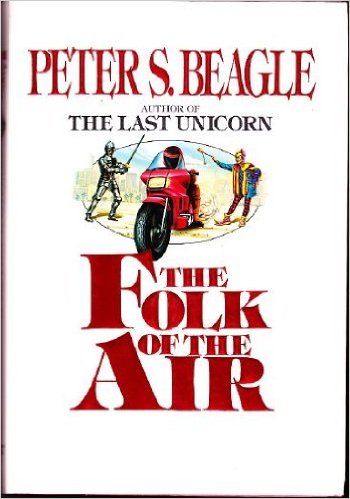The Folk of the Air

The Folk of the Air. Peter S. Beagle. New York: Ballantine Del Rey, 1987. ISBN 0345337824, hc, $16.95.
Reviewed by David Bratman
Dare I call this book Peter Beagle's Silmarillion? This is the novel he's been writing off and on for eighteen years, ever since The Last Unicorn was published, while fans of that gentle, slightly wacky fantasy, and the even gentler and wackier A Fine and Private Place waited patiently ...
So the publication of The Folk of the Air is an Event, no doubt about it, which makes this book notable on two counts. The other reason for taking note is its quality. I didn't see it until December 27th, but it is easily the best new fantasy novel I read last year. "Gentle" is not a word I would use to describe this book, but it has a full measure of Beagle's humor, imagination, and eye for the strange.
The main character is Joe Farrell, who first appeared as the hero of a short story called "Lila the Werewolf" (which may be found in the omnibus volume The Fantasy Worlds of Peter S. Beagle). It's several years after "Lila", and Farrell is making his first visit in a long time to his old stomping grounds in Avicenna, California, a city which the author describes as "based on Berkeley, when I felt like it." (He felt like it most of the time.) There Farrell has new encounters with old friends (there's a bit of sixties nostalgia about this book), and gradually drifts into a group called the League for Archaic Pleasures, which is to the Society for Creative Anachronism as Avicenna is to Berkeley. (The League is introduced to Farrell and to the reader in a marvelously subliminal way.) Both the real Society and the fictitious League consist of people who like to dress up in medieval costumes and improvise at play-acting battles and other courtly behavior. And then enters, stage right, the magical subplot ...
If The Folk of the Air had been published five years ago, it would by now be seen as a foundation stone in the currently flourishing subgenre of contemporary urban fantasy -- books like Moonheart by Charles de Lint, Tea with the Black Dragon by R.A. MacAvoy, and Brisingamen by Diana Paxson. How much the final published version of The Folk of the Air may owe to such books I couldn't say, but Beagle has captured the style of the subgenre perfectly. From the beginning, where the sense of something magical and uncanny is in the air nearly from the start, long before the supernatural actually rears its head, to the end, which features a bang-up magical battle between two of the principal characters while the others look on in dazed wonder, this book has everything to capture the interest of fantasy readers who like a magical tale in the here and now. Even the Northern California setting seems de rigeur for most books of this sort.
Farrell's character, the presence of the League, and the interplay between them are what distinguish The Folk of the Air from the books it superficially resembles. Farrell's reaction to the events around him is sometimes detached, sometimes intense. Looking at the story through his eyes gives a unique tint to the proceedings: part sardonic, part gripping. Similarly, because the League is so serious about its play-acting, it contrasts vividly with the "real" supernatural. Beagle's writing style is well-suited to the proceedings. In the early chapters in particular he keeps coming up with the most wild and offbeat possible similes and metaphors, that well suit Farrell's bemusement at the events which befall him. The asides, of varying length, concerning Farrell's various attempts at being gainfully employed are hilarious. The interplay between all the characters is complex and deftly handled, and the League members make a colorful backdrop to the magical proceedings.
Farrell doesn't take the League as seriously as they take themselves, and the scene in which his friend and lover Julie takes him to his first League event may have some SCA members wincing in embarrassment. But at the same time he sees the magic even in their play: at one point he fancies he sees the costumes dancing by themselves -- "These are surely the folk of the air", he says to himself. And so they are. In reviewing this book, I feel more than usual the difficulty of describing it adequately. The Folk of the Air is a novel that you owe it to yourself to read.
